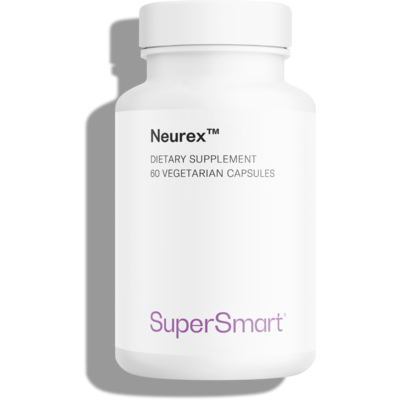3 tips for preventing Alzheimer’s disease
According to scientists, 40% of Alzheimer’s cases could be avoided by taking appropriate preventive action and paying attention to risk factors. Here are our 3 top tips for avoiding this disease.

Alzheimer’s: Europe’s no. 1 degenerative disease
A progressive cerebral disorder that causes brain cells to die, Alzheimer’s disease is characterized by gradual loss of memory and cognitive function, and has a significant impact on daily life and independence (1).
Though it affects less than 1% of under-70s, prevalence of the disease increases with age. Thus in the 70-79 age group, 1 in 25 people will be affected, rising to 1 in 5 of those aged 80-89, and 1 in 3 of those over 90. Indeed, almost 4 million people in Europe suffer from Alzheimer’s disease (2-3).
The precise mechanisms behind Alzheimer’s have yet to be established, but scientists agree that its development is linked to the accumulation of certain proteins in the brain (amyloid and tau), which ordinarily are soluble and eliminated from the body. When they accumulate, however, they form plaques around brain cells, preventing them from functioning properly and ultimately destroying them (4-5).
Alzheimer’s-preventive measures are therefore primarily centered on maintaining a healthy brain and stimulating the production of new brain cells to replace those lost with advancing age. The idea is to preserve, and if possible increase, your cognitive and cerebral reserve (6).
Exercise: the first step in preventing Alzheimer’s
Generally speaking, one of the surest ways of preventing Alzheimer’s is to lead a healthy lifestyle (7).
Exercise is a key element here. Taking regular exercise stimulates blood flow, particularly in the brain, which helps maintain healthy organs (8).
In addition, regular physical activity promotes the production of endorphins, which affect mood, and 4-(2-aminoethyl) benzene-1,2-diol, which also influences mood, but in addition, acts as a stress-buster and helps ensure good quality sleep. Mental equilibrium and restorative sleep are both key factors in preventing Alzheimer’s.
Indeed it’s during sleep phases that amyloid and tau proteins are eliminated effectively from the brain. Good quality sleep is thus crucial in preventing Alzheimer’s (9).
Finally, recent studies have shown that taking 30 minutes of intense physical activity a day stimulates the formation of new brain cells. Exercise thus helps to preserve brain reserve (10).
Protecting your cognitive and cerebral reserve against Alzheimer’s
As we’ve seen, advancing age causes the brain to become less effective at eliminating amyloid and tau proteins, ultimately leading to the death of brain cells. One solution, therefore, is to stimulate the brain: the greater the brain reserve, the longer it will be before dementia symptoms appear (11-12).
In fact, studies have shown that a lifelong low level of education and cognitive stimulation is one of the Alzheimer’s risk factors that could be most effectively mediated (13).
Similarly, other studies have demonstrated that intellectual, physical, and artistic activity, social and professional interaction, being bilingual, playing a musical instrument, and literacy all have a positive influence on cognitive and cerebral reserve and lower the risk of dementia (14-19).
More specifically, there is a significant delay in the appearance of symptoms in people who engage in these activities.
So a second important step in preventing Alzheimer’s is to provide your brain with constant stimulation by continuing to learn new things throughout life.
In short then, preventing Alzheimer’s means putting down your smartphone and picking up a book, ‘going back to school’ and making music. Not the most unpalatable therapy…
Nourishing the brain against Alzheimer’s
While it has already been widely demonstrated that a diet rich in omega-3 fatty acids are essential for maintaining a healthy brain and preventing mental problems such as depression and stress, both of which are risk factors for Alzheimer’s, adopting a Mediterranean-type diet also helps to protect against the disease, according to France’s Fondation Vaincre Alzheimer (Foundation for Overcoming Alzheimer’s) (20).
This is because a diet such as this is not only rich in omega-3 fatty acids but also contains high levels of antioxidants, vitamin C, vitamin E, vitamin B2 and vitamin B6, which help to reduce fatigue and maintain normal psychological function (21-22).
Studies are also evaluating the potential of certain plants to help combat Alzheimer’s and maintain brain health.
In one Californian study, for example, in vitro and in vivo tests showed that turmeric destroyed and prevented the formation of amyloid protein plaques in the brain (23).
Other research has looked at the potential of tiger grass (Centella asiatica, also known as gotu kola), for improving Alzheimer’s-related behavioral deficits (24).
Last but not least, scientists are examining the effects of huperzine, the active principle in Huperzia serrata, a plant used in traditional Chinese medicine, for treating memory problems. Huperzine is believed to inhibit the production of acetylcholinesterase. This is an enzyme that causes damage to acetylcholine, a neurotransmitter that promotes memory and cognitive function (25).
In summary then, key factors in preventing Alzheimer’s disease are regular exercise, good quality sleep, brain stimulation, and a healthy diet. But anyway in which you can lower your risk of developing this neurodegenerative disease is to be embraced, and to this end, certain plants and vitamins appear to offer valuable support.
SuperSmart ADVICE
References
- https://www.francealzheimer.org/comprendre-la-maladie/la-maladie-dalzheimer/premiers-reperes-maladie/
- https://www.fondation-mederic-alzheimer.org/les-chiffres-cles
- https://www.alzheimer-europe.org/dementia/alzheimers-dementia
- SADIGH-ETEGHAD, Saeed, SABERMAROUF, Babak, MAJDI, Alireza, et al. Amyloid-beta: a crucial factor in Alzheimer's disease. Medical principles and practice, 2015, vol. 24, no 1, p. 1-10.
- KOLAROVA, Michala, GARCÍA-SIERRA, Francisco, BARTOS, Ales, et al. Structure and pathology of tau protein in Alzheimer disease. International journal of Alzheimer’s disease, 2012, vol. 2012.
- https://alzheimer-recherche.org/la-reserve-cognitive-et-la-reserve-cerebrale/
- ERICKSON, Kirk I., WEINSTEIN, Andrea M., et LOPEZ, Oscar L. Physical activity, brain plasticity, and Alzheimer's disease. Archives of medical research, 2012, vol. 43, no 8, p. 615-621.
- TAN, Zaldy S., SPARTANO, Nicole L., BEISER, Alexa S., et al. Physical activity, brain volume, and dementia risk: the Framingham study. The Journals of Gerontology: Series A, 2017, vol. 72, no 6, p. 789-795.
- KANG, Jae-Eun, LIM, Miranda M., BATEMAN, Randall J., et al. Amyloid-β dynamics are regulated by orexin and the sleep-wake cycle. Science, 2009, vol. 326, no 5955, p. 1005-1007.
- PHILLIPS, Cristy, BAKTIR, Mehmet Akif, SRIVATSAN, Malathi, et al. Neuroprotective effects of physical activity on the brain: a closer look at trophic factor signaling. Frontiers in cellular neuroscience, 2014, vol. 8, p. 170.
- Stern Y, Arenaza-Urquijo EM, Bartrés-Faz D, et al. Whitepaper: Defining and investigating cognitive reserve, brain reserve, and brain maintenance. Alzheimers Dement. 2018;S1552-5260(18)33491-5.
- Stern Y. An approach to studying the neural correlates of reserve. Brain Imaging Behav. 2017 April ; 11(2): 410–416.
- Norton S, Matthews FE, Barnes DE, Yaffe K, Brayne C. Potential for primary prevention of Alzheimer’s disease: an analysis of population-based data. Lancet Neurol. 2014;13(8):788–794.
- Wilson RS, Bennett DA, Bienias JL, et al. Cognitive activity and incident AD in a population-based sample of older persons. Neurology. 2002;59(12):1910-1914.
- Verghese J, Lipton RB, Katz MJ, et al. Leisure activities and the risk of dementia in the elderly. N Engl J Med. 2003;348(25):2508-2516
- Paillard-Borg S, Fratiglioni L, Winblad B, Wang HX. Leisure activities in late life in relation to dementia risk: principal component analysis. Dement Geriatr Cogn Disord. 2009;28(2):136-144
- Walsh S, Causer R, Brayne C. Does playing a musical instrument reduce the incidence of cognitive impairment and dementia? A systematic review and meta-analysis. Aging Ment Health. 2019;1–9.
- Lee ATC, Richards M, Chan WC, Chiu HFK, Lee RSY, Lam LCW. Association of Daily Intellectual Activities with lower risk of incident dementia among older Chinese adults. JAMA Psychiatry. 2018;75(7):697–703.
- Mendez MF. Bilingualism and Dementia: Cognitive Reserve to Linguistic Competency. J Alzheimers Dis. 2019;71(2):377–388
- DENIS, Isabelle, POTIER, Brigitte, HEBERDEN, Christine, et al. Omega-3 polyunsaturated fatty acids and brain aging. Current Opinion in Clinical Nutrition & Metabolic Care, 2015, vol. 18, no 2, p. 139-146.
- ZHUO, Jia-Min et PRATICÒ, Domenico. Acceleration of brain amyloidosis in an Alzheimer’s disease mouse model by a folate, vitamin B6 and B12-deficient diet. Experimental gerontology, 2010, vol. 45, no 3, p. 195-201.
- WEIR, Donald G. et SCOTT, John M. Brain function in the elderly: role of vitamin B12 and folate. British medical bulletin, 1999, vol. 55, no 3, p. 669-682.
- YANG, Fusheng, LIM, Giselle P., BEGUM, Aynun N., et al. Curcumin inhibits formation of amyloid β oligomers and fibrils, binds plaques, and reduces amyloid in vivo. Journal of Biological Chemistry, 2005, vol. 280, no 7, p. 5892-5901.
- SOUMYANATH, Amala, ZHONG, Yong-Ping, HENSON, Edward, et al. Centella asiatica extract improves behavioral deficits in a mouse model of Alzheimer's disease: investigation of a possible mechanism of action. International Journal of Alzheimer’s Disease, 2012, vol. 2012.
- YANG, Guoyan, WANG, Yuyi, TIAN, Jinzhou, et al. Huperzine A for Alzheimer’s disease: a systematic review and meta-analysis of randomized clinical trials. PloS one, 2013, vol. 8, no 9, p. e74916.
Keywords
5 Days
great products and prices
great products and prices
Marie
11 Days
Easy to navigate site
Easy to navigate site, had what I was searching for, good price. easy order-check out
James Tucker
17 Days
My skin is clearing up nicely!
Pretty good for my skin so far.
Christian
19 Days
The new packaging is excellent
The new packaging is excellent - finally! No more squashed boxes and torn envelopes.
GORAN
20 Days
Great Product
Great Product
Larry Garrett
24 Days
Quick shipping
Quick shipping; good price. No issues!
Mary McCarty
26 Days
Thr product is very good and is helping…
Thr product is very good and is helping me on my health. Then is always on time
LUGO Luz
28 Days
Buying was fine
Buying was fine. I had problems with the website not recognizing my login info, and had to call to get it fixed. Other than that, everything was good.
David S. Clark
29 Days
Your super maca and super ginseng are…phenomenal
Your super maca and super ginseng are phenomenal supplements that compliment each other when taking them together. Fantastic feeling of well-being and lots of mid day energy without the crash.
Keith Mason
31 Days
I have had amazing results with every…
I have had amazing results with every supplement I've purchased. I am extremely satisfied with this company
kirstin Torres
31 Days
Fine products
Fine products . They are on the leading edge of online supplements. The only issue -so far-is they sometime run out of subscription items.
Jason Argos
34 Days
The ordering process is very user…
The ordering process is very user friendly and the products always come in a timely manner.
CARTER Rhonda
35 Days
The price for Dr
The price for Dr. Pero's AC-11 is reasonable and in line with his views. (my former colleague). Keep it pure.
CAMPBELL Clayton
38 Days
Right on every time.
Right on every time.
Arthur Nicholas
41 Days
They are cheaper than everyone else and…
They are cheaper than everyone else and the shipping was fast. Great company.
Patricia Adams





